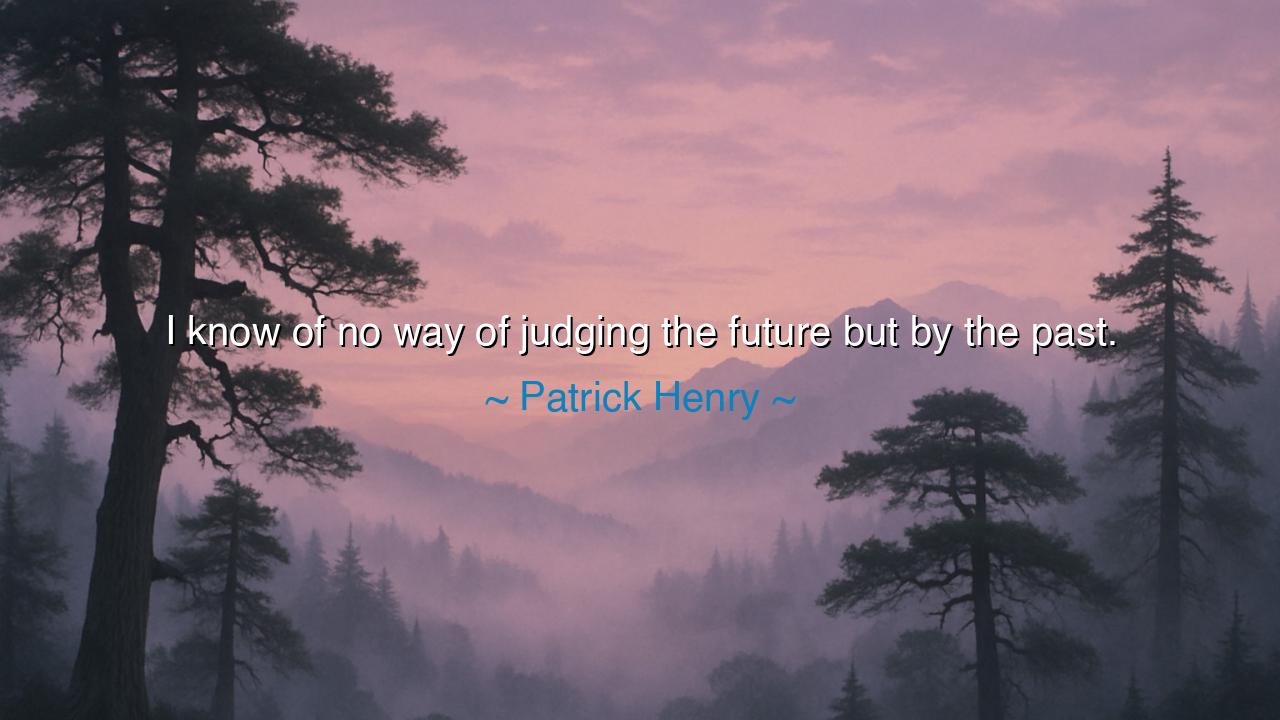
I know of no way of judging the future but by the past.






In the timeless march of history, few truths stand as solid and enduring as the one voiced by Patrick Henry: "I know of no way of judging the future but by the past." These words carry the weight of a man who, having witnessed the tumultuous battles for freedom, recognized the invaluable lessons hidden within the ancient and recent history. In the heart of this declaration lies a wisdom that transcends time, reminding us that to understand the shape of what is to come, we must first look to what has already been. The past is not merely a collection of old events—it is the blueprint for the future, a guide by which we can predict, prepare, and navigate the unknown.
The ancients were keenly aware of the importance of understanding the past to shape the future. The Greeks, particularly Herodotus, the father of history, understood that to know the future, one must first study the deeds of the past. Herodotus sought to understand the rise and fall of great empires, knowing that history was a teacher, one whose lessons could help future generations avoid the same mistakes or build on the successes of those who came before. The idea that history repeats itself is deeply rooted in the belief that the actions and choices of the past leave traces that can inform future decisions. The past, for the ancients, was the wellspring of wisdom from which the future could be drawn.
Marcus Aurelius, the Stoic emperor, similarly relied on the lessons of history to guide his rule. In his personal reflections, known as the Meditations, he often turned to the wisdom of the past to shape his actions as a ruler. He was aware that his decisions were part of a long continuum of rulers, philosophers, and statesmen, each leaving their imprint on the world. Aurelius knew that by understanding the successes and failures of those who ruled before him, he could make more informed, wise decisions in his own time. Patrick Henry’s words align with the Stoic wisdom of Aurelius—the future is not something to be feared, but something to be understood through the lens of history.
Take, for example, the great story of Julius Caesar. His rise to power was not a random occurrence, but the result of careful study and understanding of previous conflicts and the ambitions of those who came before him. Caesar’s military genius was built upon the knowledge of past battles, strategies, and the patterns of human behavior. He learned from the mistakes of others, as well as their successes, using this knowledge to craft his own legacy. Caesar’s life is a testament to the truth that the future is shaped not just by one’s present actions, but by the lessons learned from the past, and those who fail to recognize history’s lessons often meet the same fate as their predecessors.
In more recent times, Winston Churchill, during the Second World War, relied heavily on the study of history to guide his decisions. He constantly looked to past wars, particularly the First World War, to understand the nature of totalitarian regimes, the intricacies of alliances, and the strategic importance of timing. Churchill’s speeches often invoked the memory of Britain’s previous triumphs and failures, rallying the nation not just to stand in the present moment, but to stand in the long tradition of British resilience. His ability to learn from the past, to recognize the mistakes and successes of those who had come before him, was a crucial element in his leadership during one of the darkest chapters of history.
The lesson in Patrick Henry’s quote is clear: we cannot divorce ourselves from the past in our pursuit of the future. The past is not a distant relic, but a living and vibrant teacher whose lessons remain as relevant as ever. To ignore the wisdom of history is to walk blindly into the future, unprepared and vulnerable to the same mistakes that have been made before. Instead, we must study the past—our own personal histories, the histories of our nations, and the great histories of civilization—and use that knowledge as a map to navigate the challenges that lie ahead. In knowing the past, we empower ourselves to face the future with clarity and purpose.
In our own lives, this wisdom calls us to reflect on our past and learn from it. Whether in our personal decisions, in the way we shape our communities, or in how we engage with the world, the history of our experiences, both good and bad, will always serve as a guide. Just as Socrates believed that an examined life was the key to wisdom, so too must we reflect on our own pasts and use those reflections to chart a path toward a better future. The future, as Patrick Henry wisely notes, is not an empty horizon—it is the continuation of the paths we’ve already walked, and it is in understanding the footprints left behind that we can ensure we do not wander aimlessly but move forward with purpose.
Thus, let us heed the wisdom of Patrick Henry and the ancients: to know the future, we must first understand the past. The mistakes and triumphs of history are not to be forgotten, but to be studied, as they hold the keys to building a future that is both wise and prosperous. By looking to the past, we equip ourselves with the strength to face the future, recognizing that the lessons of yesterday are often the guides we need to shape tomorrow.






AAdministratorAdministrator
Welcome, honored guests. Please leave a comment, we will respond soon